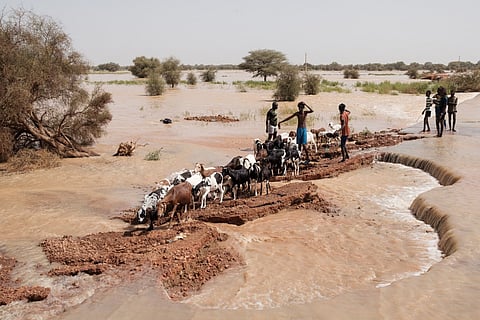

MATAM: Seeking shelter in a tent of sticks and rags after floods devastated her village in northeastern Senegal, Khardiatou Sy says she feels abandoned by the government days ahead of snap parliamentary elections.
The 28-year-old is one of tens of thousands to have been displaced when torrential rains caused the Senegal River to burst its banks in October.
Wide swathes of farmland were submerged in north and eastern regions of the West African country, sweeping away the livelihoods of a population largely dependent on agriculture.
"It's hard to live. If your field is destroyed, you have nothing to eat," said Sy, whose house was reduced to rubble by the rising water.
Her village of Bely Dialo used to live off rice cultivation, she said, but its inhabitants must now fish in the nearby floodwaters to eat and earn money.
The scale of the destruction is one of the many challenges facing Senegal's new government, which took office in April and is heading into legislative elections on November 17.
Along with what Prime Minister Ousmane Sonko calls "catastrophic" public finances, the government must tackle high unemployment and address the large numbers of young people risking their lives to reach Europe.
Opinions on the new government's first seven months were divided in the rural Matam region, often seen as a stronghold of former president Macky Sall.
While some pinned their hopes for a better future on the ambitious rhetoric of the ruling Pastef party, others felt the government had not done enough to address the challenges of daily life.
'So many died in the ocean'
"The state has been nowhere to be seen," since the flooding, Sy said, adding that the 30 households of her village had been living in tents for almost a month.
President Bassirou Diomaye Faye has visited some flood-affected areas in recent weeks, with the government allocating eight billion CFA francs ($13 million) to alleviate the situation.
But Sy said that Bely Dialo had only received assistance from local authorities.
Meanwhile, at a Pastef rally in the nearby city of Matam, joy and expectation filled the evening air as thousands played vuvuzelas and chanted songs in admiration of Faye and Sonko.
After Faye dissolved the opposition-led parliament, Pastef is banking on the election to secure a legislative majority and implement its agenda of economic transformation, social justice and the fight against corruption.
"The Matam region is the poorest region. That's why we wanted to vote for Pastef, so that the region could change," said 31-year-old Aby Sow.
"We young people want to work," she added. "So many young people have died in boats in the ocean".
Senegal's coasts are one of the main departure points for migrants attempting the perilous Atlantic crossing to Europe.
Thousands have died or disappeared in recent years, risking their lives in overloaded, often unseaworthy boats in search of brighter prospects.
The Matam region has the worst employment rate in Senegal, according to the national statistics agency.
Just under a fifth of the region's working age population were in paid employment in 2021. Nationally, the figure stands at 57.6 percent.
'Children have no work'
As part of a vast 25-year national development project unveiled last month, the government said it planned to turn the region into a hub for processing phosphate into fertiliser.
"The youth of Matam will no longer need to go to Dakar or abroad. Things will change here", Sonko declared on stage at the rally, pledging the creation of 10,000 direct jobs in the sector.
But in Matam's bustling market, Pastef's ambitious agenda hadn't broken through to prospective voters, who said the government had done little to alleviate their immediate day-to-day struggles.
Houley Kone, 50, who makes a living selling weeds for animal feed, said prices were going up and life was becoming more difficult.
"For us, the government doesn't even exist," she said.
The most pressing issue among market vendors appeared to be opportunities for young people.
"What we want is for the government to create jobs because we have sons who haven't had the chance to go to school," Kone said.
"The children have no work, they sit at home or often are in the fields," she added.
Sira Niang, 24, said she had studied three years for a diploma but could not find a job in her sector, instead working in a shop to get by.
She said if she found a better job elsewhere or abroad, she would go.